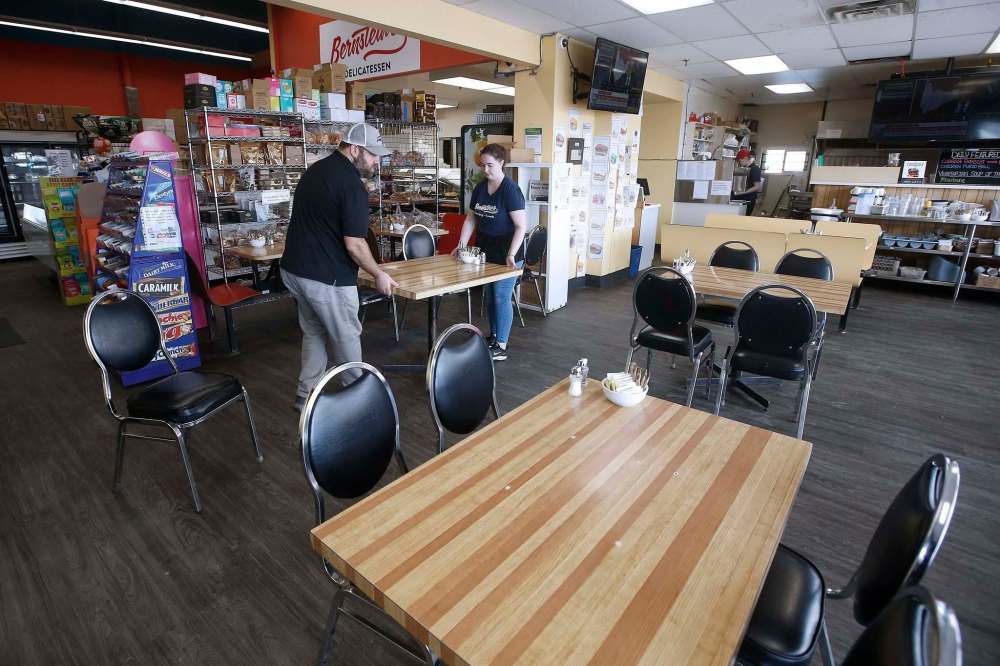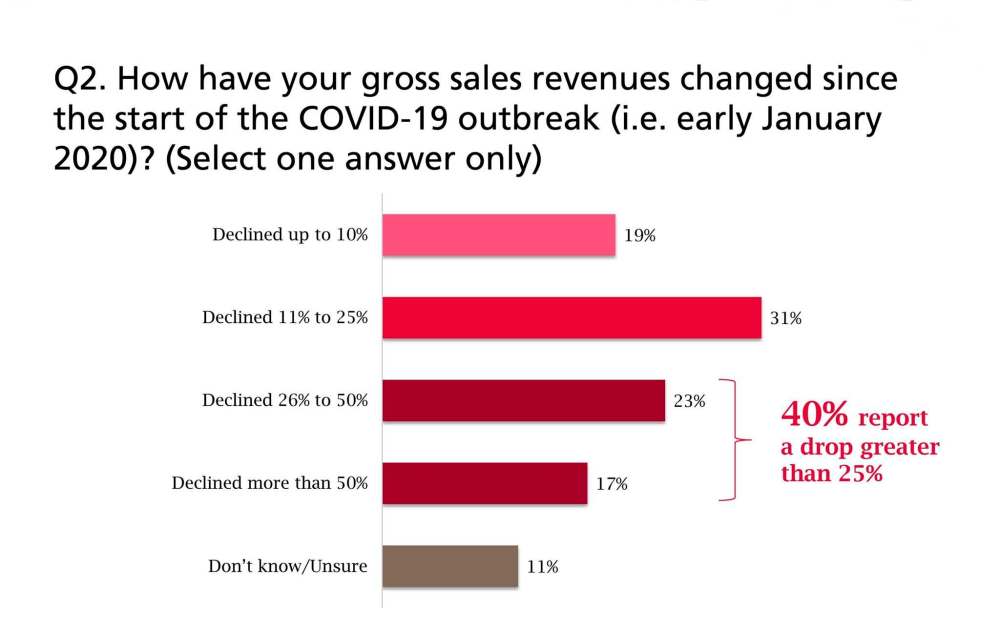Virus causing havoc for businesses
Survey shows almost half have seen lower sales
Advertisement
Read this article for free:
or
Already have an account? Log in here »
To continue reading, please subscribe:
Monthly Digital Subscription
$1 per week for 24 weeks*
- Enjoy unlimited reading on winnipegfreepress.com
- Read the E-Edition, our digital replica newspaper
- Access News Break, our award-winning app
- Play interactive puzzles
*Billed as $4 plus GST every four weeks. Offer only available to new and qualified returning subscribers. Cancel any time.
Read unlimited articles for free today:
or
Already have an account? Log in here »
Hey there, time traveller!
This article was published 17/03/2020 (1781 days ago), so information in it may no longer be current.
The social restrictions caused by the COVID-19 pandemic are causing havoc on many businesses, and a new survey suggests things could get a lot worse the longer it drags on.
A large survey by the Canadian Federation of Independent Business (CFIB), taken during just the last few days, showed almost half of businesses have already felt a drop in sales, and for 40 per cent of them it’s already more than a 25 per cent hit.
What is particularly stark is that one-quarter of the almost 9,000 respondents said they will not be able to survive if sales fall below 50 per cent.

“I have doing this for 26 years. I don’t recall anything even approaching this. It is quite huge,” said Dan Kelly, the national president of the 110,000-member organization.
While some businesses may have the option of beefing up e-commerce, many do not.
Some restaurants were already going hard on home delivery, but others, like the family-owned Bernstein’s Deli, have not really had to in the past, enjoying the patronage of a very loyal client base.
But now they’re going to have to try something new.
“We have always had delivery but we never really marketed it,” said owner Aaron Bernstein. “Now we are trying to get people aware that we’re happy to bring stuff to them.”
They have also taken chairs out of the dining room to accommodate appropriate levels of social distancing.
“There really isn’t a lunch rush these days,” he said. “But I see no reason to close the dining room until we are told we have to. We are very thoroughly sanitizing every surface multiple times a day.”
Bernstein is also hoping that the return of thousands of snowbirds might generate a little more business. He said about 90 per cent of his customers are there at least once per week and many are of retirement age.
“There will be lots of people coming home who are not supposed to leave their house for two weeks,” he said. “Hopefully when they come home we will get lots of calls to bring them stuff.”
But the sad part of the CFIB survey is that most of the respondents — more than 60 per cent — do not imagine capturing more than 10 per cent of sales in ways that eliminate face-to-face contact. Of those, the majority say they have no ability to generate sales that way.
“Those are the ones I really worry about,” Kelly said. “There will be businesses that just do not make it.”
As the scope and scale of the economic devastation is only just starting to materialize, there is no magic bullet in sight. But the survey does indicate that small businesses are hoping for some kind of government assistance.

Kelly for one is particularly keen on the approach that some countries like Denmark and other European nations have implemented, where the government will pick up 75 per cent of wages.
“The business still has to come up with 25 per cent and that will be a struggle for some,” Kelly said. “Wages are the largest expense for most small- and medium-sized businesses. If the government is picking up the tab for the wage bill my hope is that it will protect the relationship between the employer and employee such that they are not laid off and they can go immediately back to work as soon as the crisis ends.”
Respondents were looking for whatever tax break they can find, but Kelly believes help with retaining employees will not only help potentially laid-off workers who live cheque to cheque, but also bolster the operation when more normal times return.
“I don’t know how long the crisis situation will last but I think we really need to turn our attention very quickly to putting in place steps so that we can pivot back to full production as soon as this ends,” he said.
Prime Minister Justin Trudeau said Tuesday he expects to make a major announcement on economic actions today and hinted that it could include tax changes.
More than 90 per cent of small businesses, especially those that depend on physically interacting with their customers, will be dependant on some kind of government support to survive.
About 70 per cent of those who responded to the CFIB survey are calling for temporary tax relief on income, payroll and sales taxes, 66 per cent want planned tax increases to be cancelled, and 65 per cent are asking for a delay in tax filing deadlines and the elimination of penalties for late payments and remittance.
Another 58 per cent believe wage subsidies for businesses to retain staff could help, while 46 per cent want the government to create incentives to boost consumer spending.
martin.cash@freepress.mb.ca

Martin Cash
Reporter
Martin Cash has been writing a column and business news at the Free Press since 1989. Over those years he’s written through a number of business cycles and the rise and fall (and rise) in fortunes of many local businesses.
Our newsroom depends on a growing audience of readers to power our journalism. If you are not a paid reader, please consider becoming a subscriber.
Our newsroom depends on its audience of readers to power our journalism. Thank you for your support.

